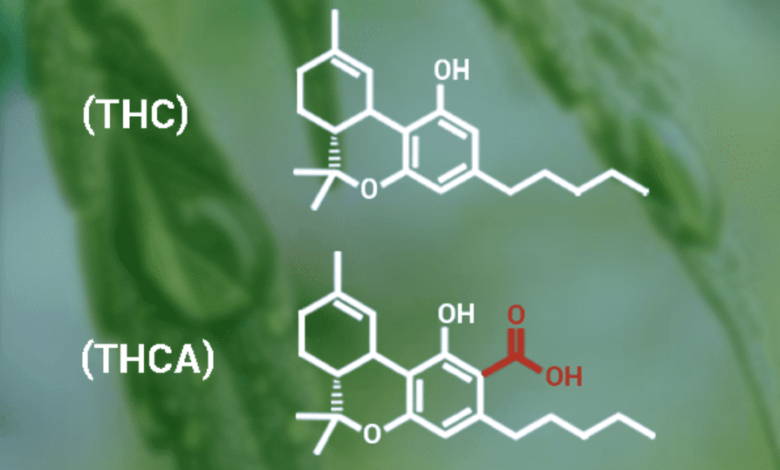THCA to THC: Uncovering the Transformation of Cannabinoids

The cannabis plant is known for its complex chemistry, with over a hundred different compounds, each with its unique properties and effects. Two of the most prominent and intriguing compounds are (Tetrahydrocannabinolic Acid) and (Tetrahydrocannabinol). In this article, we will explore the transformation of THCA to THC, shedding light on the science, methods, and its implications.
What is THCA?
THCA, or Tetrahydrocannabinolic Acid, is the non-psychoactive precursor to THC found abundantly in raw cannabis. It is responsible for many of the plant’s therapeutic benefits, such as anti-inflammatory and neuroprotective properties, without inducing the high associated with THC.
The Science Behind THCA
THCA is produced by the trichomes on the cannabis plant. It is an acidic compound and doesn’t bind well with the body’s endocannabinoid receptors. This lack of affinity for the receptors is what makes THCA non-psychoactive.
Decarboxylation: The Magic Behind THC
To convert THCA into THC, a process known as decarboxylation is required. This involves the removal of a carboxyl group from THCA through the application of heat. This transformation is what turns THCA into the psychoactive compound THC.
Factors Affecting THCA to THC Conversion
Several factors influence the decarboxylation process. These include temperature, humidity, and the duration of exposure to heat. Precise control of these factors is crucial to achieving the desired levels of THC in the final product.
Methods of Decarboxylation
Decarboxylation can be achieved through various methods, including smoking, vaping, and cooking. Each method has its own set of pros and cons, depending on the user’s preferences and needs.
The Role of Heat and Time
Heat is the primary catalyst in the conversion of THCA intoTHC. Higher temperatures generally lead to faster decarboxylation, but too much heat can degrade the cannabinoids and terpenes, affecting the overall quality of the product.
Health Implications
THC, when compared to THCA, can induce psychotropic effects. Therefore, individuals using cannabis for medicinal purposes should be aware of the decarboxylation process and its potential impact on their health.
The Entourage Effect
The entourage effect refers to the synergistic interaction of various compounds in the cannabis plant, including cannabinoids and terpenes. Understanding the transformation of THCA intoTHC plays a significant role in harnessing the entourage effect for therapeutic benefits.
Medicinal and Recreational Uses
THC is well-known for its recreational use, while THCA is more commonly associated with medicinal applications. The transformation between these compounds allows users to choose the effects they desire.
THCA intoTHC: A Comparison
A detailed comparison between THCA and THC will help users understand the differences in their chemical structures, effects, and applications.
Dosage Considerations
It’s crucial for users to consider the dosage of THC carefully, as the transformation from THCA can significantly impact the potency of cannabis products.
Legal Aspects
The legal status of THC and THCA varies from place to place. Understanding these differences is vital for individuals who use cannabis products.
Current Research and Developments
The scientific community continues to study the transformation of THCA into THC, seeking ways to optimize the process for medical and recreational applications. Read more…
Conclusion
The transformation of THCA to THC is a fundamental process in the cannabis industry. It impacts the potency and effects of cannabis products, making it a topic of great interest. Understanding the science behind this transformation is essential for both recreational and medicinal users.
FAQs
1. Can I consume raw cannabis for medicinal purposes?
- Consuming raw cannabis provides THCA, which has various potential medicinal benefits. However, the psychoactive effects of THC are not present in raw cannabis.
2. How does heat affect the transformation of THCA to THC?
- Heat is the catalyst for decarboxylation, which converts. The temperature and duration of exposure to heat influence this transformation.
3. Are there any legal restrictions on THCA and THC products?
- The legal status of THCA and THC products varies by region. It’s essential to be aware of local regulations.
4. Can I experience the entourage effect with THCA alone?
- The entourage effect is primarily associated with the combined action of various cannabis compounds, including THC. While THCA has its benefits, the full entourage effect may require a broader spectrum of compounds.
5. What are the potential medicinal benefits of THCA?
- THCA has been studied for its potential anti-inflammatory, neuroprotective, and other therapeutic properties. However, research is ongoing to fully understand its medical potential.
In conclusion, the transformation of THCA to THC is a crucial process that influences the effects of cannabis products. Whether you’re using cannabis for recreational or medicinal purposes, understanding this transformation is key to making informed choices and maximizing the benefits of this versatile plant.
